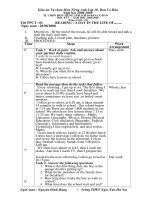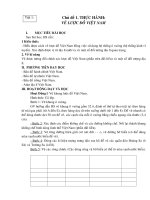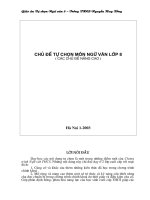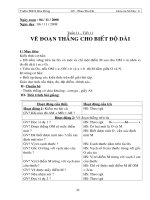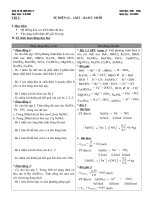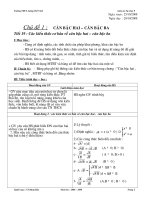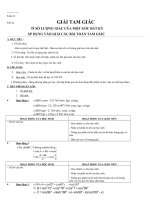giao an tu chon 11(CTC)
Bạn đang xem bản rút gọn của tài liệu. Xem và tải ngay bản đầy đủ của tài liệu tại đây (256.03 KB, 33 trang )
Week: 1 THE PAST SIMPLE AND THE PAST PROGRESSIVE,
Aim: By the end of the lesson, Students will be able to review and use the past tenses.
Teaching aids: lesson plan, handouts, blackboards.
Procedure:
T Stages and contents T’s activities Ss’ activities
I. THE PAST SIMPLE TENSE
1. Form to be
- Affirmative: S + V2/ed…. S + was/were……
- Negative: S + did + not + V….. S + was/were + not…..
- Interrogative: Did + S + V….? Was/Were + S ….?
2. Use
a. Diễn tả một hành động xảy ra trong quá khứ xác đònh rõ thời gian
(yesterday, ago, last……, in the past, in 1990)
Ex: - My father bought this house 10 years ago.
- Mr. Nam worked here in 1999.
b. Diễn tả một loạt các hành động xảy ra liên tiếp trong quá khứ.
Ex: - Last night, I had dinner, did my homework, watched TV and went to
bed.
- When she came here in 1990, she worked as a teacher.
II. THE PAST PROGRESSIVE TENSE
1. Form
- Affirmative: S + was/were + V-ing….
- Negative: S + was/were + not + V-ing…..
- Interrogative: Was/Were + S + V-ing….?
2. Use
a. Diễn tả một hành động xảy ra ở một thời điểm trong quá khứ.
Ex: They were playing chess at 4 o’clock yesterday.
b. Diễn tả một hành động đang xảy ra có một hành động khác xen
vào trong quá khứ (when, while, as). Hành động đang xảy ra dùng thì
Past Progressive, hành động xen vào ra dùng thì Past Simple.
Ex: - I was studying my lessons when he came.
- We saw him while we were walking along the street.
* EXERCISE
Choose the best answer to complete each sentence.
1) You ...................... your new hat when I ...................... you yesterday.
A. were wearing/ had met B. wore/ had met
C. wore/ was meeting D. were wearing/ met
2) As I ................. the glass, it suddenly ................... into two pieces.
A. cut/ broke B. was cutting/ broke
C. cut/ was breaking D.was cutting/ had broken
3) A burglar ............... into the house while we ................. television.
A. broke/ were watching B. broke/ watched
C. had broken/ watched D. broke/ had watched
4) It was midnight. Outside it ......................... very hard.
A. rains B. rainedC. had rained D. was raining
* EXERCISE
Put the verbs in parentheses into the correct tense.
1) While Diana (watch) ................................. her favourite TV
- Review the
form, the use of
the past simple
and past
progressive.
- Get Ss to do
the exercise
- Ask Ss to
choose the best
answer to
complete each
sentence.
- Ask Ss to put
the verbs in
parentheses
into the correct
tense
-Look at,
listen and
answer the T’s
questions.
1. D were
wearing / met
2. B was
cutting/ broke
3. A broke /
were watching
4. D was
raining
programme, there (be) .......................... a power cut.
2) Who (drive) ........................... the car at the time of the accident?
3) I (do)......................... some shopping yesterday, when I
(see) ........................... your friend.
4) What ............. you (do) ............... when I (come) ......................... to
your office yesterday?
1. was watching
/ was
2. was driving
3. was doing /
saw
4.were / doing /
came
Week 2 WRITING: WRITE ABOUT A FRIEND
Aim: By the end of the lesson students will be able to describe his/her friend’s characteristics
and personalities
Teaching aids: handouts.
Procedures:
T Contents T’s activities S’s activities
4
10
20
10
I. Warm-up: Chatting
II. Pre-writing
1. Useful language:
- Height: tall, short, medium height …
- Face: square, oval, large …………….
- nose : straight, crooked …………....
- hair: long/short/curly hair , black hair....….
- appearance: beautiful, handsome, slim, thin………………
- personality: modest, honest, generous,
sense of humour, quick-witted ……………
………………..
* The structures are used:
- he/ she is
tall/short/slim ………
very beautiful …………..
honest / quick-witted …….
- he/she has got
long hair ……….
oval face ……………
straight nose ……………
- he/ she often wears/
is wearing
jeans with T-shirt……..
III. While- writing
IV. Post-Writing
* Suggested the answer
My best friend is called Hoa. He is 15 years old. We met each
- Handout
- Run through
- Explain
- Ask Ss to
write on the
posters
- Go around
and help Ss
with
vocabulary
- Pay attention
- Work in 4
groups.
1
other three years ago at my friend’s birthday party. He is tall
and very good-looking, he has got dark hair and big brown eyes.
He has got square face and crooked nose. He always wears a
jeans with a T-shirt but today he is wearing a trousers, a shirt
and a tie. He is very romantic. He always buys me flowers and
presents……
V. Home work
- Prepare next lesson
- Correct
- Say
- Hang on
their poster
- Take note
Week 3 THE PAST PROGRESSIVE, THE PAST SIMPLE AND
THE PAST PERFECT
Aim: By the end of the lesson students will be able to review and use the past
progressive, the past simple and the past perfect correctly.
Teaching aids: handouts.
Procedures:
T Contents T’s activities S’s activities
20 I. The Past Simple Tense
1. Form To be
- Affirmative: S + V2/ed…. S + was/were……
- Negative: S + did + not + V….. S + was/were + not
- Interrogative: Did + S + V….? Was/Were + S ….?
2. Use
a. Diễn tả một hành động xảy ra trong quá khứ xác đònh rõ
thời gian (yesterday, ago, last……, in the past, in 1990)
Ex: - My father bought this house 10 years ago.
- Mr. Nam worked here in 1999.
b. Diễn tả một loạt các hành động xảy ra liên tiếp trong quá
khứ.
Ex: - Last night, I had dinner, did my homework, watched
TV and went to bed.
- When she came here in 1990, she worked as a teacher.
II. The past progressive.
1. Form
- Affirmative: S + was/were + V-ing
- Negative: S + was/were + not + V-ing
- Interrogative: (WH-) + was/were+ S + V-ing ?
2. Use
Thì QKTD dùng để diễn tả:
- Một hành động xảy ra (và kéo dài) vào một thời điểm hoặc một
khoảng thời gian trong q khứ.
Ex: I was studying my lesson at 7 last night.
- Một hành động đang xảy ra (V-ing) ở q khứ thì có một hành động
khác xen vào (V2/ed)
Ex: He was sleeping when I came.
- Hai hành động diễn ra song song cùng mơt lúc trong q khứ.
Ex: While I was doing my homework, my younger brother was
watching TV.
III. The Past Perfect Tense
- Review the
tenses
- Pay attention
1. Form
- Affirmative: S + had + V3/ed….
- Negative: S + had + not + V3/ed…..
- Interrogative: Had + S + V3/ed….?
2. Use
a. Diễn tả một hành động xảy ra trước một thời điểm trong quá
khứ.
Ex: By the end of last month, she had made 4 skirts.
b. Diễn tả một hành động xảy ra và hoàn thành trước một hành
động khác trong quá khứ (before, after, by the time, when).
Hành động xảy ra trước dùng thì Past Perfect, hành động xảy ra
sau dùng thì Past Simple.
Ex: - After Nam had done his homework, he went to bed.
- They had lived in Dong Thap before they moved to HCM city.
EXERCISE
I. Choose the best answer among A,B,C, and D.
1. When I ……to the party, Sally and Doug …., John …...drinks.
A. was coming/ had danced/ made
B. had come/ danced/ made
C. came/ were dancing/ was making
D. have come/ are dancing/ is making.
2. When I ………….there, dinner ………..so I had a drink first.
A. get / is prepared B. get / has been prepared
C. got / had been prepared D. got / was being prepared.
3. We ……….your son in the school play last night. He …….a
terrific acting job.
A. saw / was doing B. were seeing/ did
C. had seen/ had done D. have seen/ has done
4. ………………………..him? – Last night.
A. When do you meet B. When did you meet
C. When have you meet D. When will you meet
5. When we ………..to see him last night he ………..to music.
A. come/ is listening B. had come/ listened
C. came/ was listening D. were coming/ listens
6. They ……good preparation before they …….…their final
examination yesterday.
A. made / had taken B. had made / took
C. have made/ take D. will make/ take
7. He ……………..for London one year ago.
A. left B. has left
C. leaves D. had left
8. I ……………….to the market with my mother yesterday.
A. go B. went
C. have gone D. was going.
9. ……………..you ………………..out last night?
A. Did / go B. Do / do
- Ask Ss to do
the exercise
- Instructions
- Groups work
of 1 table
1. C
2. D
3. A
4. B
5. C
6. B
7. A
8. B
9. A
10. B
11. D
12. B
C. Have / gone D. Were / going
10. When they …………….in the garden, the phone ……………
A. worked / was ringing B. were working / rang
C. worked / rang D. work / rings
11. After they ……………their breakfast, they ………..shopping
yesterday.
A. have / go B. had/ had
C. had / had gone D. had had / went
12. They ………………..tea when the doorbell ……….. .
A. have/ is ringing B. were having/ rang
C. had had / rang D. having / ringing
13. Nam is a careful driver but yesterday he …………carelessly.
A. drove B. had driven
C. drives D. was driving
14. What ………………….he ………………before you came?
A. does / do B. had / do
C. had / done D. has / done
15. While mum was watching TV, I ………….my homework.
A. am doing B. was doing
C. had done D. has done
16. After she ………………hospital, she had a long holiday.
A. leaves B. is leaving
C. had left D. has left
17. The film ……….by the time we ………to the cinema.
A. already began / got B. have already begun / go
C. had already begun / go D. already began / had got
18. When I arrived at his house, he ……………….a phone call.
A. answers B. answered
C. has answered D. was answering
19. When we ……………..at the station, the train ……………… .
A. arrived/ had left B. arrived/ left
C. had arrived/ had left D. had arrived/ left
13. A
14. C
15. B
16. C
17. C
18. D
19. A
Week: 4 READING: UNIT 2
Aim: By the end of the lesson, Students will be able to improve their reading skill as well as way to guess
meaning of new words.
Teaching aids: pictures, posters, cards.
Procedure:
T Stages & Content T’s activities Ss’activities
Read the passage and choose the best answer for each blank.
MARIA’S HOMECOMING
When the bus ... (1) ... in a small square, Maria was reading her
magazine and didn’t realize that she had arrived at her destination.
“This is Santa Teresa,” Martin said. “You’ve arrived home!” I
suppose your cousin will be ... (2) ... for us. Come on. I’ll carry the
bags.” Maria thought, “All those years when I ... (3) ... in New
York, I used to dream if this moment. And now it’s real, I can’t
believe it! Here I am, I’m really standing in the square.” Santa
- Get Ss to
read the
passage and do
Teresa was Maria’s birthplace, but she often left the town at the
age of six. She had some ... (4) ... of the town, and some photos, but
did she belong here still? She didn’t know. Nobody was waiting in
the square. Perhaps her cousin Pablo hadn’t received Maria’s
letter. “What are we going to do now?” asked Martin. “There
isn’t ... (5) ... a hotel here!”
1) A. reached B. got C. stooped D. came
2) A. expecting B. waiting C. welcoming D. receiving
3) A. was living B. have lived C. live D. am living
4) A. recall B. memories C. thinking D. remembering
5) A. even B. hardly C. too D. very
the Multiple
Exercise 1. C stooped
2. B waiting
3. A was
living
4. B
memories
5. A even
Week: 5 READING: UNIT 3
Aim: By the end of the lesson, Students will be able to scan for specific information about party.
- To help them improve reading skill.
Teaching aids: Textbook, blackboard, poster…
Procedure:
T Stages & Content T’s activities Ss’activities
Read the passage and choose one correct answer for each
question.
PREPARING A DINNER PARTY
Giving a dinner party is a wonderful way of entertain people.
You can also make new friends and give others the chance to get to
know each other better.
It needs planning, though. First, make a guest list, with different
kinds of people and a mixture of women and men. Don’t invite
couples because they aren’t so much fun.
When you know who can come, find out what they like to eat
and drink. Note down any who are vegetarians, or who can’t eat or
drink certain things for religious seasons.
Then plan their menu. Include a first course, a choice of main
courses and a dessert, plus lots of people’s favourite drinks.
The next thing to do is the shopping. Make sure buy more than
enough of everything, and that someone can help you carry it!
On the day, start cooking early. Give people appetizers like
Greek mezze or Spanish tapas, so they don’t get hungry if they
have to wait. Serve the delicious meal, sit down with your quests
and have a good time – you’ve earned it!
1) Which of the following is NOT mentioned as the purpose of
giving a dinner party?
A. to entertain people. B. to make new friends.
C. to get people to know more about their host and hostess.
D. to help people to know each other better.
2) when giving a dinner party, you should NOT
invite ........................ .
A. husbands and wives. B. those who are vegetarians.
C. both women and men. D. those who can’t eat or drink
- Get Ss to read
the passage and
do the Multiple
Exercise
1. C to get
people to
know more
about their
host and
hostess.
2. A husbands
and wives.
3. B a supper
4. D because
the guests may
be hungry
certain things.
3) The menu should include these EXCEPT ..........................
A. a first course B. a supper C. a dessert D. main courses
4) According to the passage, starters should be
served ...........................
A. because the guests want to have a good time together
B. because the guests like eating them
C. because the guests want to eat them while having to wait
D. because the guests may be hungry while having to wait
5) What should you do while the guests are having their evening
meal?
A. Stand beside the guests without doing anything.
B. Sit down with the guests and have a good time.
C. Sit down with the guests to show your politeness.
D. Only serve the guests with the food.
while having
to wait
5. B Sit down
with the guests
and have a
good time.
Week 6 PASSIVE INFINITIVE AND PASSIVE GERUND
Aim: By the end of the lesson students will be able to use “passive infinitive and passiv gerund”
correctly
Teaching aids: handouts
Procedures:
T Contents T’s activities S’s activities
1. Passive Infinitive:
Form: S + V + to be + V3/ed
- Được dùng với nghĩa bị động sau các động từ sau:
Want, expect, refuse, hope, decide, agree, plan, would like, fail,
manage, demand, ……..
- khi làm bài cần lưu ý nghĩa của câu là chủ động (V + to V) hay bị
động ( V + to be + V3/ed)
Ex: The plants want to be watered every day.
2. Passive Gerund
Form: V + Being + V3/ed
- Được dùng với nghĩa bị động sau các động từ sau:
Enjoy, finish, postpone, avoid, keep, practise, miss, spend,
allow/permit, advise, give up, ……………
- khi làm bài cần lưu ý nghĩa của câu là chủ động (V + V-ing) hay bị
động ( V + being + V3/ed)
** LƯU Ý: Sau giới từ (in, on, at, about, from, ……) vẫ dùng
( being + V3/ed)
Ex: I disliked being taken to the zoo when I was a child
I. Choose the best answer among A, B, C or D
1. Mrs. Kelly didn’t want ………………..on.
A. to be operated B. being operated
C. to operated D. to be operating
2. The bus driver was so tired of ………….the same route every day
that he asked for a transfer.
A. to drive B. being driven
C. driving D. drive
3. No one has better qualifications. Carol is certain ………for the job.
A. to choose B. having chosen
C. to be chosen D. being chosen
4. The house needs ………………… .
- give
instructions
- Pay
attention
1 A
2 C
3 C
4 D
5 B
6 D
7 B
8 D
A. to pain B. to be painting
C. to be paint D. painting
5. Do you want ……………………by the doctor?
A. to examine B. to be examined
C. being examined D. being to examine
6. Alice didn’t expect ……………………….to Bill’s party.
A. asking B. being asked
C. to ask D. to be asked
7. The mouse family avoided …………………by coming out only
when the house was empty and the two cats were outside.
A. catching B. being caught
C. to have been caught D. to be caught
8. My boss doesn’t …….me to use the telephone for private calls.
A. let B. get
C. know D. allow
9. I think it’s no good …………………him about that.
A. to tell B. told
C. being told D. telling
10. He enjoys …..the crossword puzzle in the newspaper everyday.
A. doing B. do
C. to do D. done
11. The fans climbed over the fence to …………………..paying.
A. avoid B. postpone
C. refuse D. stop
12. They …..all day swimming and sunbathing at the beach.
A. took B. used
C. passed D. spent
13. Keeping fit ………………….taking exercise every day!
A. seems B. tries
C. concerns D. means
14. Peter …………………..to go in for the exam.
A. avoided B. let
C. advised D. decided
15. Let us know as soon as possible so that we can start
…………………arrangements.
A. make B. makes
C. making D. made
16. “I was not there at that time,” he said.
A. He denied being there at that time.
B. He denied that he was there at that time.
C. He denied to be there at that time.
D. He denied that he wasn’t there at that time.
17. I don’t mind ……………….. late, if it will help at all.
A. to work B. to be work
C. working D. being working
18. I remember ……………to the zoo when I was a child.
A. to take B. to be taken
C. taking D. being taken
19. We managed …………..over the wall without being seen.
A. climb B. climbing
C. to climb D. to be climbed
20. Lan expected ……………to the university, but she wasn’t.
A. to admit B. to be admitted
C. admitting D. being admitted
9 D
10 A
11 A
12 D
13 D
14 D
15 C
16 A
17 C
18 D
19 C
20 B
Week 7: GERUND AND PRESENT PARTICIPLE
Aim: By the end of the lesson students will be able to use “gerund and present participle”
correctly
Teaching aids: handouts
Procedures:
T Contents T’s
activities
S’s
activities
I. Gerund (V-ing)
1. Làm chủ từ cho động từ:
Ex: Singing is one of her hobbies.
( Ca hát là một trong những sở thích của cô ta)
2. Làm túc từ cho động từ (V + V-ing):
- Sau các động từ sau:
enjoy, finish, postpone, avoid, keep, practise, miss, spend, allow/permit,
advise, give up, ……………
Ex: She enjoys singing.
3. Làm túc từ cho giới từ (in, on, at, about, from, ……) (Prep + V-ing)
Ex: She is fond of singing.
II. Present participle: (V-ing)
1. Dùng sau các động từ chỉ giác quan: feel, hear, see, watch, smell ( nhấn
mạnh sự tiếp diễn của hành động).
Ex: I saw him writing a letter
2. Dùng trong cấu trúc
S + V + O + V-ing
→ catch, find, spend, waste, leave
Ex: She let him waiting outside
3. Dùng để diễn tả các hành động kế tiếp nhau ( gần nhau về thời gian ) của
cùng một chủ từ hàng động trước dùng V-ing
Ex: Opening the drawer, she took out a book.
EXERCISE
1. They all denied …………………her.
A. to see B. of seeing
C. having ever seen D. ever having seen
2. In addition to ……………….., I do the washing up.
A. I prepare dinner B. I am preparing dinner
C. prepare dinner D. preparing dinner
3. Tom was accused of …………………some top secret document.
A. to steal B. having stolen
C. for stealing D. to have stolen
4. No one can prevent us from ………………..good things.
A. to do B. doing
C. do D. done
5. But after …….it over, I decided to laugh at myself and just join anyway.
A. having thought B. I have thought
C. I thought D. to have thought
6. After…………..it, please return the form to us in the envelope provided.
A. to complete and sign B. you are completing and signing
C. completing and sign D. completing and signing
7. He never admits ……………….wrong.
A. to being B. of being
C. to be D. to have been
8. I am interested …………………the new course next week.
A. in learning C. in learn
B. to learn D. on learning
9. I look forward to ……………………home next month.
A. go B. to go
Give
instruction
Hand-out
Pay
attention
Do the
exercise
Work in
pair
C. going D. done
10. Excuse me ……..late. I got stuck in a traffic jam for more than one hour.
A. to being B. for being
C. being D. having been
11. Listen! I hear someone …………..….the gate. It can’t be Peter because
he is at work at present.
A. to open B. open
C. opening D. opened
12. ………………..so much, the doll is still on the shelf.
A. Cost B. Costs
C. To cost D. Costing
13. ……………….anxious to please us, they told us all we wanted to know.
A. Be B. To be
C. Being D. In being
14. After ………….fight, the police arrested two men and a woman.
A. stopping B. stop
C. to stop D. stopped
15. …..one hand on the steering wheel, Anna opened a can of soda pop
with her free hand.
A. To keep B. Keep
C. In keeping D. Keeping
16. I could feel my hands ……………with fear!
A. to shake B. shaking
C. was shaking D. none is correct
18. I can hear voices upstairs.
A. I can hear someone talking upstairs.
B. Someone is heard to talk upstairs.
C. There is strange voices upstairs.
D. It is too noisy upstairs.
19. Jim said he hadn’t stole the jewels.
A. Jim denied stealing the jewels
B. Jim didn’t agree to steal the jewels
C. There was no denying that Jim had stolen the jewels
D. Jim had stolen the jewels, but he denied it
20. I caught him …………over my wall.
A. to climb B. climb
C. having climb D. climbing
21. “ Where are the children ?” – “ I saw …………….in the yard.”
A. them playing B. they playing
C. them to play D. they play
Week 8: WRITING A FORMAL LETTER OF ATTITUDE
Aim: By the end of the lesson students will be able to “writing a formal letter of attitude”
Teaching aids: handouts
Procedures:
T Contents T’s activities S’s activities
I. Task 1. Choose the best answer to fill in the blank
Dear Mr and Mrs Smith,
I am very happy to (1)----- a donation of $10,000 from you yesterday
morning. We will certainly use (2) ---- money to build a few
classrooms (3) ----- the homeless children in our area. I would like to
(4) ---- our gratitude for your help. I think the children will be very
(5) ---- to you for bringing them the pleasure of (6) ------to school.
As soon as we have (7) ----- building the classrooms. I will send you
some photos (8) -------- them.
Hand out Group work
of two tables
1 B
2 A
3 D
4 A
I do thank you again.
Your sincerely,
Thomas
1 . A play B. receive C. give
2. A. the B. a C. x
3. A. in B. out C. for
4. A. express B. press C. turn
5. A. thankful B. sorry C. regret
6. A. go B. going C. went
7. A. began B. stopped C. finished
8. A. of B. on C. in
Task 2: . Imagine that you have just received a donation of one
thousand dollar from a charity to build your house. Use the
suggestions in Task 1 to write a letter to express your gratitude.
Give
instructions
5 A
6 B
7 C
8 A
Work in four
groups
Week 9 READING: UNIT 5
Aims: By the end of the lesson, students will be able to read for specific information and
understand the text and choose the correct answer
Teaching aids: handout
Procedures:
T Contents T’s activities St’s
activities
I. Read the passage and choose the best answer for each blank.
VOLUNTEERS ABROAD
More and more young people are (1)……….….voluntary work abroad. The
wild variety of jobs and destinations available is making it an increasingly
attractive option for those who have just left school and have a year free
before university. Many choose to spend these twelve months working in
poor countries. There they will earn little (2)…………no money. However,
they will be doing something useful – and enjoying the experience.
The work may (3)…….…..of helping the local communities, for example
by helping to build new road or provide water supplies to isolated rural
villages. Other projects may concentrate more on conservation or
environmental protection (4)………..kind of jobs it is, it is certain to be (5)
………….and worthwhile, and an experience that will never be forgotten.
1. A. doing B. making C. taking D. getting
2. A. with B. but C. or D. and
3. A. consist B. include C. contain D. involve
4. A. Any B. What C. However D. Whatever
5. A. challenging B. dangerous C. difficult D. attracted
II. Read the passage and choose one correct answer for each question.
PARENTS’S DREAMS
Parents often have dreams for their children’s future. They hope their
children will have a better life than they had. They dream that their children
will do things that they couldn’t do. Parents who come to the U.S from
foreign countries hope their children will have better education here. They
think their children will have more career choice and more successful lives.
They make many sacrifices so that their children will have more
opportunities. They think their children will remain close to them because of
this. Some children understand and appreciate these sacrifices and remain
close to their parents. However, other children feel ashamed that their
parents are so different from other Americans.
1. Parents often dream of …………………….
A. their children’s making a lot of money in the future.
B. one day seeing their children become famous people.
Hand out
Give
instructions Group
work of 2
tables
1 A
2 C
3 A
4 D
5A
C. one day living on their children’s money.
D. a bright future for their children.
2. Parents who come home from U.S from foreign countries hope that …...
A. their children will have a lot of careers.
B. their children become successful directors.
C. their children will have more opportunities foe good education.
D. their children will make a lot of sacrifices.
3. Parents think their children will remain close to them because ……
A. they give their children a lot of money
B. of the sacrifices
C. they know their children will be successful in the future
D. they are living in a foreign country.
4. The word career in line 4 is closest in meaning to ………………
A. education B. travel
C. subject D. profession
5. The word close in line 5 is closest in meaning to …………………….
A. dear B. friendly
C. helpful D. kind
1 D
2 C
3 B
4 D
5 D
Week 10 REPORTED SPEECH WITH INFINITIVE
Aim: By the end of the lesson students will be able to use “Reported Speech With Infinitive”
correctly
Teaching aids: handouts
Procedures:
T Contents T’s activities S’s activities
I. Câu tường thuật với “ to infinitive”
1. Câu mệnh lệnh gián tiết khẳng địng:
Ex: “ Remember to finish your exercise, Tom,” The
teacher said .
→ His teacher reminded Tom to finish his exercise.
(“ Hãy nhớ hoàn thành bài tập của em, Tom à”, Thầy
giáo nói)
2. Câu mệnh lệnh gián tiếp phủ định:
Ex: They said, “ Don’t talk in the class.”
( Họ nói, “ Đừng nói chuyện trong lớp”)
They told us not to talk in the class.
(Họ bảo chúng tôi không nói chuyện trong lớp)
3. Một số cấu trúc khác:
a. Đề nghị, lời mời.
Ex: He said, “ Would you like to go out for a drink?”
( Anh ta nói, “ Mời anh ra ngoài dùng nước.”)
He invited me to go out for a drink.
( Anh ta mời tôi ra ngoài uống nước.)
b. Yêu cấu:
Ex: She said “ Can you land me your book?”
( Cô ấy nói, “ Anh có thể cho tôi mượn sách của anh?”)
She asked me to lend her my book.
( Cô áy yêu cầu tôi cho cô ấy mượn sách của tôi.)
c. Khuyên bảo:
Ex: “ You should study harder,” my mother said.
( Mẹ tôi nói, “ Con nên học chăm hơn.”)
My mother advised me to study harder.
( Mẹ tôi khuyên tôi học chăm hơn.)
d. Hứa hẹn.
Give instructions Pay attention
Ex: “ I will give you my book ” He said.
( “Tôi sẽ đưa cho anh quyển sách của tôi” Anh ta nói)
He promised to give me his book
(Anh ta hứa đưa cho tôi quyển sách của ang ấy)
*** S + V (+ O) + to + Vo ****
EXERCISES
Rewrite each sentence, beginning as show, so that the
meaning stay the same.
1. “ Would you mind not smoking in this room?” She
said to Jim.
She asked him ………………………………
2. “ You should not drink too much coffee at night,”
said Bob.
Bob advised ………………………………………
3. “ Don’t be late for class again, Jim.”
The teacher asked …………………………………
4. “ Would you like to go out for dinner with us
tonight?”
Mary invited ………………………………………
5. “ All right, I will pick you up at 6pm tonight.”
She agreed ………………………………………
6. “ Don’t forget water the flowers for me, Tom”
Mother reminded …………………………………
7. “ Don’t worry, I will help you with the money.”
He promised ………………………………………
8. “I’am sorry I can’t lend you this book. I need it right
now.”
Minh refused ………………………………………
Ask ss to do the
exercises
Group work of 2
tables
Week: 11 A LETTER OF REPLY
Aim: By the end of the lesson, Students will be able to write a letter of reply
Teaching aids: lesson plan, blackboards.
Procedure:
T Stages and contents T’s
activities
Ss’
activities
* Writing a letter of reply
From the cues given, write a letter of reply.
41) Thank you/ letter/ welcome/ General Knowledge Quiz.
.....................................................................................................................
42) number/ participants/ be/ 4/ members/ each/ team
......................................................................................................................
43) Quiz/ hold/ 89 Le Loi Street/ HCM City/ November 30/ 2007
......................................................................................................................
44) starting time/ be/ 8:00 p.m/ but/ you/ be/ present/ an hour/ earlier
......................................................................................................................
45)Please/contact/ me/ phone/ 067.892899/ or/ e-mail/
......................................................................................................................
- Ask Ss
to write a
letter of
reply
- Write a
letter of
reply
Week: 12 REPORTED WITH GERUND
